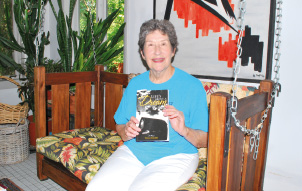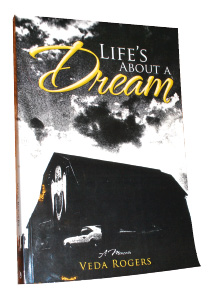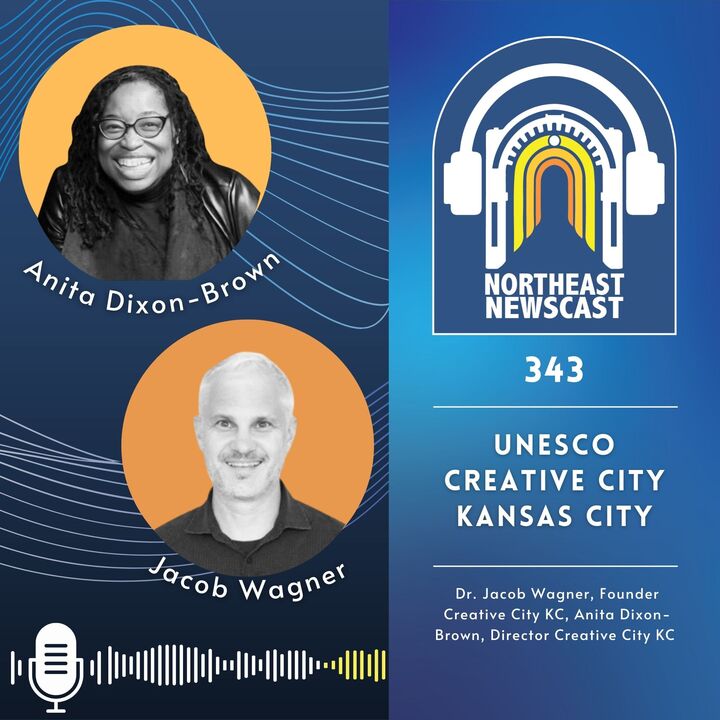
By LESLIE COLLINS
July 18, 2012
The aroma of coffee and scrambled eggs filled the kitchen. As Veda Rogers prepared breakfast for her guest, she reminisced about her days of theater and her new book, “Life’s About A Dream.”
Rogers last graced the stage in 2001 and now she and her husband, Bruce, own and operate Gladstone Manor, a bed and breakfast in Historic Northeast.
Upstairs in the billiard room, photographs of past plays line the walls – some quirky, some serious. For Bruce and Rogers, acting was a passion and became a way of life.
“Sometimes I think life is truer in the theater,” Rogers said. “When we’re outside the theater, people have their various faces on, their various artifices, but on the stage you are honest; you are a character. And it’s a life.
“I think life is more real on the stage than it is off.”
Rogers grew up in a musically gifted family and enjoyed acting from a young age, performing with her childhood sweetheart and now husband, Bruce.
She was a country girl who grew up on a farm outside of Quenemo, Kan. All nine children pitched in on the farm, and Rogers described the household as noisy.
“I remember my mother going around like this,” Rogers said, covering her ears. “And you know, my older brothers they were bossy.”
Of course, Rogers admitted to being bossy herself.
When Rogers was about five years old, her mother and father formed a family orchestra. Her father directed and her mother played the piano. With the exception of the 18-month-old, each child played an instrument.
“I played the bass drum,” Rogers said. “I was five years old, but I could keep time.”
They played at community events and also performed on KMBC’s radio show, “Brush Creek Follies.”
When her brother Bill died in WWII, the orchestra ended.
In addition to performing in high school plays and forensics, Rogers sang duets with Bruce to music written by Bruce’s father, John.
Before Bruce was born, John was married to Lela Rogers and became the step-father of Ginger Rogers. Ginger became a well-known actress, dancer and singer who appeared in 73 films. In 1940, she won the Academy Award for Best Actress in the film, Kitty Foyle.
John often told the story of how Ginger won a Charleston contest dancing to a song he’d written. That contest won Ginger a vaudeville tour and John served as her manager.
“It was always a trip to sing a song that he wrote and have him play for you,” Rogers said.
It was also John who piqued her interest in theater, she said.
Both Bruce and Rogers graduated from the University of Kansas with a degree in music education, and in 1970 they opened their own theater at Pamona Lake near Vasser, Kan. Dubbed the Vasser Playhouse, the theater was located inside a barn that the two remodeled.
During the summer, Vasser Playhouse averaged six shows a season and plays ranged from musicals to melodramas to comedies and more. Life’s About a Dream details what it was like raising a family during that time and operating a playhouse and several other theaters.
“You’ll find happy things, sad things,” Rogers said of the book. “The plays are happy things. Even a sad play was a happy play to do, because it’s fulfilling to do something like ‘The Diary of Anne Frank.’ It was a beautiful production.”
The Rogers’ paid their actors and stage crew and provided room and board. Crew members were also required to cook and clean for the dinner theater.
A typical work day would begin at 8 a.m. and sometimes a tech rehearsal wouldn’t be finished until 2:30 a.m.
With plays also came mishaps. There was the time an actor was supposed to ring a doorbell, but the bell malfunctioned. To compensate, the actor said, “Zzzzzz.”
Both Rogers and another actor stood on stage.
“She looked at me and I looked at her and both of us just did everything we could to keep from laughing,” Rogers said.
Another time, Rogers’ character had 19 costume changes. When a crew member was helping Rogers with her dress, she said, “Veda, you’ve got a terrible rip in the seam. Take off the dress and I’ll fix it.”
Rogers said there wasn’t time and used black hairspray to mask the rip.
When the Rogers’ opened the Whippoorwill Showboat in 1974, that also came with challenges. The 65-foot steamboat was the only operating steamboat west of the Mississippi River, she said. It operated as a dinner theater cruise on Pomona Lake and could fit up to 50 passengers. A steam generator powered the tape recorded music and the generator hardly ever maintained 100-volt power, Rogers said. As a result, sometimes the music would play slower or the pitch would go lower or higher. Other times, the music sped up. Singing actors would have to adjust.
“We just told everybody to keep a sense of humor and make sure the passengers have a good time,” Rogers said.
During steamy nights, bugs also became an issue or the weather would become windy.
“We thought everything would be perfect, but it wasn’t always perfect,” she said.
On June 17, 1978, the Whippoorwill became famous in a tragic way.
“I can’t begin to tell you what it was like,” Rogers said. “It was actually a beautiful night. The evening started off quite lovely.”
The Whippoorwill had just taken off, ready to perform another show. A waterspout formed and as the boat tried to turn back to shore, the tornado struck, capsizing the boat. Sixteen people drowned, including actor Tina Kramer.
The Topeka Capital Journal quoted the Chief Forecaster of the National Weather Service in Topeka Phil Shideler as saying, “It was a once in a million-million type of storm.”
Rogers helped identify bodies and her husband sobbed, “I should have died, too. I really wish I had.”
Both local, national and world media outlets covered the catastrophe. Rogers called the media “vultures.”
“Veda and Bruce had overheard someone asking why this event was getting so much press, and a representative from the UPI or AP stated, ‘There just isn’t anything else happening this weekend,'” Rogers wrote in her book.
Following repairs, the Whippoorwill finished its final season in 1978.
“Our first lawsuit came in the week after our daughter (Kathryn) died. Talk about pain. That was pretty painful,” she said.
Lawsuits continued to pour in and several settlements were reached.
For Rogers, writing the book became cathartic, she said.
“I remember sometimes I’d wake up in the middle of the night and I’d think about something and then I’d go in and put it down,” she said. “I’d sit there and cry and cry when I’d write about something, but it’s very healing.”
It’s also filled with positive memories for the actors, who have already facebooked her, thanking her for writing the book.
As for the title of the book, that stems from her daughter, Kathryn, singing “Row, row, row your boat” as a young child.
“When she was about 2 ½, she used to sing, ‘Merrily, merrily, merrily, life’s about a dream.’ She was one talented little girl,” Rogers said. “I can remember writing in a Christmas card, ‘Yeah, Kathryn says life’s about a dream.’ And you know, I kind of think she’s right.”


















